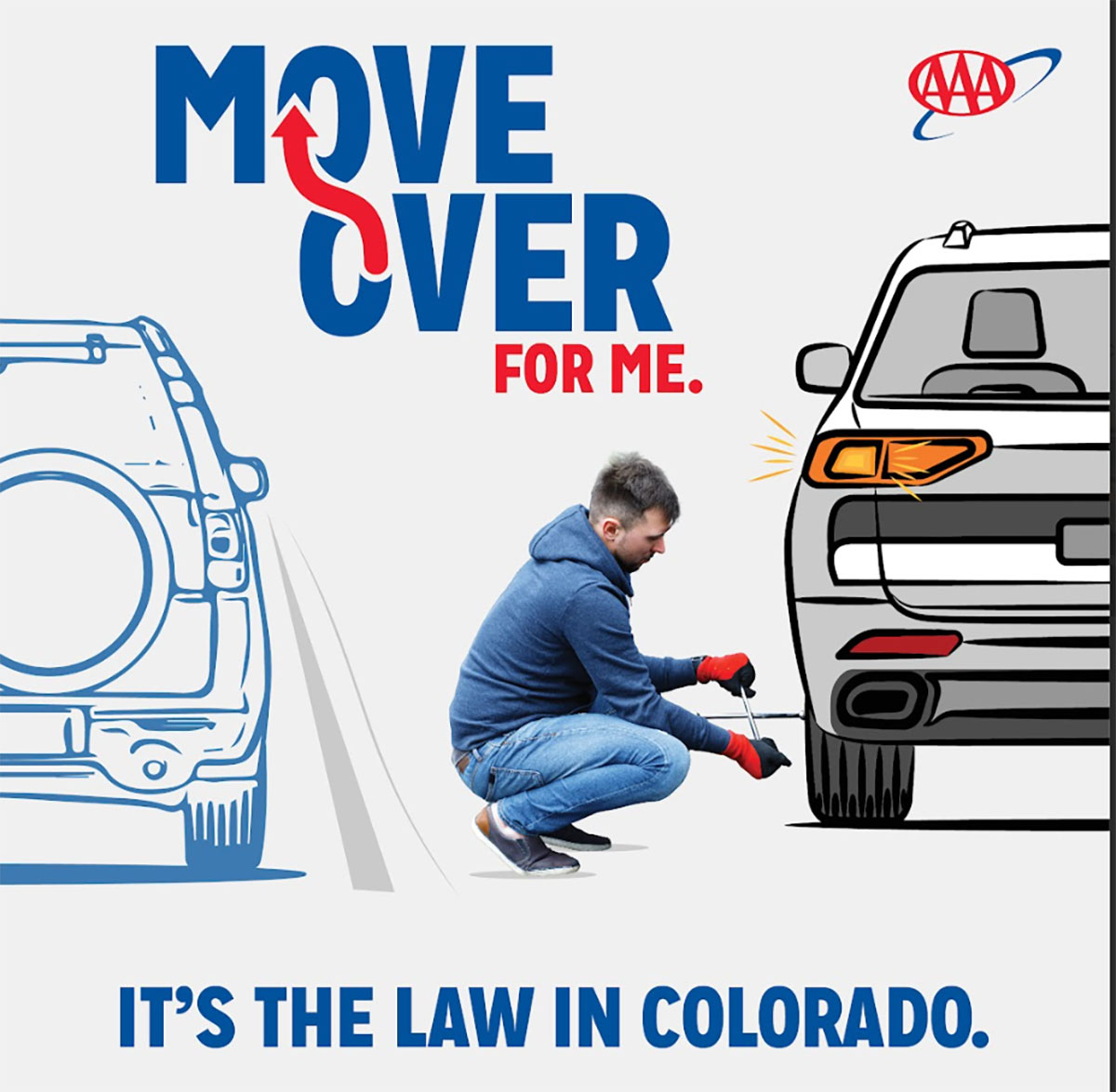Starting Monday, Aug. 7, Colorado is enhancing its Move Over Law to provide greater protection for people and their vehicles on the side of the road. This significant change goes beyond just safeguarding police and emergency responders; it now requires drivers to also move over when passing disabled vehicles on the side of the road.
Earlier this year, Gov. Jared Polis signed into law HB23-1123, requiring drivers to move over a lane whenever they encounter any stationary vehicle on a highway with its hazards flashing – and if they can’t move over, they must slow down to at least 20 mph below the posted speed limit. The new protections come as 2022 marked the deadliest year on Colorado roads on record.
Gov. Polis has also proclaimed Monday, Aug. 7 as “Slow Down, Move Over Day” in the State of Colorado.
On July 31, the Colorado Department of Transportation, Colorado State Patrol, the National Highway Traffic Safety Administration (NHTSA) and AAA held a press conference announcing the changes that take effect statewide on Monday, Aug. 7.
“With the updated Move Over Law, we are taking a significant stride toward our goal of zero deaths on Colorado roads,” said Matthew C. Packard, chief of the Colorado State Patrol. “Slowing down for disabled vehicles shows respect for every road user, and together, we can create a safer driving environment for everyone.”
While all states have a Move Over law to protect emergency responders, Colorado joins nineteen other states that provide protections to all disabled vehicles. With this change, Colorado’s Move Over laws are now among the nation’s strongest.
The penalty for failing to move over or slow down for a disabled vehicle includes a Class 2 misdemeanor traffic offense, with a possible fine of $150 and a 3-point license violation.
“People dealing with an issue on the side of the road are in a dangerous position, especially our first responders and others who regularly are near live traffic,” said Shoshana Lew, executive director of CDOT. “It is up to all of us, in every situation, to make the road as safe as possible when we see a vehicle pulled over on a shoulder. Move over and slow down for everyone, every time.”
So far this year seven CDOT safety patrol trucks have been hit by passing motorists resulting in one serious injury. In addition, four CDOT attenuators trucks have been hit in Denver.
“Please think about the hundreds of law enforcement officers, fire, EMS, maintenance and tow operators when you’re driving down the road or highway,” said Gina Espinosa-Salcedo, the Region 8 regional administrator for the National Highway Traffic Safety Administration. “We need your cooperation and compliance. Please give space to emergency personnel, because it isn’t just a courtesy – it’s the Law.”
The roadside’s inherent dangers are why, according to research from the Centers for Disease Control and Prevention, motor vehicle towing is one of the country’s deadliest lines of work – with a death rate 15 times more than that of every other private industry combined. In 2022, across the country, 51 emergency responders who were working at the roadway were struck and killed, including 17 law enforcement officers, 18 tow truck operators, 4 mobile mechanics, and 11 firefighters and EMS personnel. Each year, nearly 350 people are struck and killed while outside a disabled vehicle, according to the National Highway Traffic Safety Administration.
“As Coloradans, we look out for one another,” said Skyler McKinley, regional director of public affairs for AAA – The Auto Club Group. “This strengthened Slow Down, Move Over law takes that spirit to the roadside with a straightforward message: If you see any vehicle on the side of the road with its hazards on, slow down and move over. It’s always been the right thing to do, and now it’s the law, too.”
Despite the existence of a Move Over law in all states, the AAA Foundation for Traffic Safety found that nearly a quarter of people (23%) are unaware of the law in the state where they live – even though 51% of Coloradans, for example, report having been stuck in a disabled vehicle on the side of the road. To help ensure widespread awareness of Colorado’s updated Move Over law, AAA, in partnership with CDOT and the Colorado State Patrol, has launched a campaign to educate drivers about these changes and their role in keeping our roads safe for everyone.

